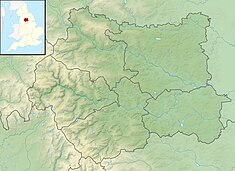Elland Power Station
| Elland Power Station | |
|---|---|

Elland Power Station
|
|
| Country | England |
| Location | West Yorkshire |
| Coordinates | 53°41′40″N 1°49′22″W / 53.694312°N 1.822772°WCoordinates: 53°41′40″N 1°49′22″W / 53.694312°N 1.822772°W |
| Commission date | 1959 |
| Decommission date | 1991 |
| Operator(s) | Central Electricity Generating Board |
| Thermal power station | |
| Primary fuel | Coal-fired |
| Power generation | |
| Nameplate capacity | 180 MW |
| grid reference SE118220 | |
Elland Power Station was a coal-fired power station situated adjacent to the Manchester to Wakefield railway line and on a loop of the River Calder, north east of the town of Elland in West Yorkshire. The station occupied a site of some 65 acres.
The construction of Elland Power Station was planned in 1945. It was designed and built by the then Central Electricity Generating Board (CEGB), Northern Project Group. Building work began in 1951 and the project cost £10 million. The first generating unit began generating electricity on 7 August 1959, but the station did not officially open and begin generating at full capacity until 28 April 1961. The station used three 1.21 GW (gigawatt) generating sets. Later in the 1960s, the station won an award for its clean and efficient operation.
Coal from the Yorkshire coalfields was delivered by train on the adjacent Calder Valley Line and moved around the site using 0-4-0 shunters. Elland No. 1, a CEGB 0-4-0 diesel shunter is preserved at Mangapps Railway Museum, Burnham-on-Crouch, Essex.
On 22 November 1971, the station's conveyor belt was destroyed in a fire. After the UK's electric supply industry was privatised in 1989, the station was operated by PowerGen. The station closed in 1991 before being demolished in 1996. The station's site is now the site of Lowfields Industrial Estate although the associated switching substation was retained and remains in use.
...
Wikipedia

